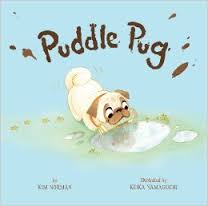It is no secret that this blog likes dogs, one of the most accessed posts is
Dogs at the Book Fair. Over the years we have accumulated quite a collection of books about dogs and even one that is narrated by a dog.
Gaston by Kelly DiPucchio and illustrated by Caldecott Honor recipient, Christian Robinson, features two dog families who meet in the park, a family of poodles who have a French bulldog member and a family of French bulldogs who have a poodle member. Clearly, there has been a mistake. A switch is made, can you guess how it turns out? The book is worth reading if only to read the the girl poodle names out loud: Fi-Fi, Foo-Foo and Ooh-La-La in your very best French accent. The Sonoma County Library has
nine copies and the AR is 2.8.
I'm My Own Dog is written and illustrated by Caldecott Honor winner, David Ezra Stein. Our hero declares that, "I'm my own dog. No one owns me. I own myself." He takes care of everything he needs except for a little place on his back that needs a scratch that he can't reach. A little guy scratches his back then follows him home. What is a dog to do but let him stay. He trains the little guy and soon they become best friends. The Sonoma County Library has
eight copies and the AR is 1.5.
Mrs. Birdhead has had it with Bobo's bad behavior in
How To Be A Good Dog by Gail Page. She sends him to the dog house. But Cat misses Bobo. Armed with a dog training manual, Cat teaches Bobo to shake, fetch, heel, lie down, roll over and stay. All goes well until Mrs. Birdhead comes home from the grocery store. How does Bobo get back in her good graces? The Sonoma County Library has
one copy and the AR is 1.4.
Homer by Elisha Cooper is a celebration of old dogs. Homer's family is at the beach house. does he want to play chase with the other dogs? No, sitting on the porch is fine. He also declines to explore the field, go to the beach and swim in the waves. Eventually everyone comes back and joins him on the porch and shares their adventures. Does he need anything? No he has everything he needs, he has his family. We have an old dog much like Homer, this story rings true. The Sonoma County Library has
eleven copies and the AR is 1.8.
Percy loves puddles of all kinds but the one he loves most of all does not love him back because it is occupied by Mama Pig and her piglets. A big storm comes and a tree falls in the perfect puddle scattering Mama and her piglets. One is missing. Where could she be? Percy finds her and now the perfect puddle loves him back. The rhyming in this book is a great vocabulary builder.
Sonoma County Library has
one copy and the AR is 2.4.
A few more dog books reviewed over the years:
An easy reader,
A Dog Is a Dog by Stephen Shaskan.
Atticus, the aforementioned dog narrator knows what is going on, his co-narrator, Ben, has no clue in
Road Trip by Gary and Jim Paulsen.
Pug and Other Animal Poetry by Valerie Worth and illustrated by Stephan Jenkins is a collection of
eighteen short poems about animal behavior.
Since National Dog Day is a celebration of rescue, it is only fitting that
Trouper by Meg Kearney is included.
One more link from Brightly,
21 Woof-tastic Children's Books About Dogs. Enjoy!










